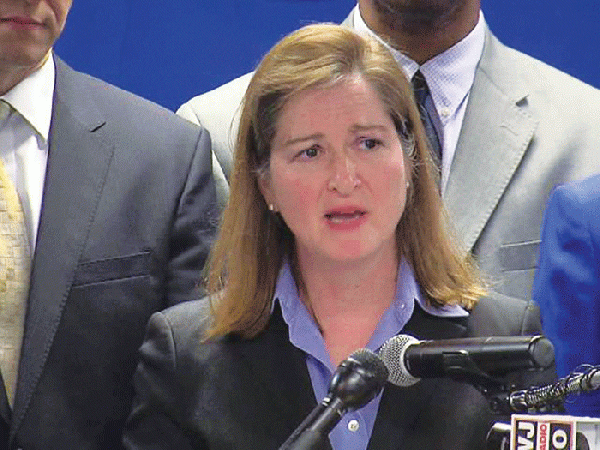
|
| MIA’s location in Ann Arbor. |
DETROIT — The Justice Department announced that it has filed a lawsuit against Pittsfield Charter Township, alleging that it denied an Islamic academy a permit to build a school on a vacant land.
The Michigan chapter of the Council on American Islamic Relations (CAIR-MI) originally brought the case forward against the township, located outside of Ann Arbor.
Michigan Islamic Academy (MIA), a full time accredited pre-kindergarten through grade 12 school based in Ann Arbor, was aiming to relocate to Pittsfield in 2011.
The academy’s original location was not large enough to accommodate a cafeteria, computer lab, science lab, gym, locker rooms, auditorium, library or administrative office space.
With the majority of its student body living in or near Pittsfield, leaders of the academy found an ideal site in the township to relocate the center. It was only eight miles from the original location.
However, following a public meeting in August 2011, the city’s planning commission rejected the proposal, stating the property had only been zoned for a “small-scale school” and that traffic, noise and light would be disruptive to local residents.
The suit claims the township imposed a substantial burden on MIA’s exercise of religion when it refused to grant request for rezoning the vacant land.
The Justice Department’s civil rights division and the U.S. Attorney’s Office of the Eastern District of Michigan are both claiming discrepancies in the planning commission’s decision. The township had approved the Washtenaw Christian Academy and the Ypsilanti Free Methodist Church, both of which required zoning approvals from the city planning commission and are considered similar sized projects to the MIA proposal.
The Justice Department alleges the city violated the Religious Land Use and Institutionalized Persons Act of 2000. The complaint is an allegation of unlawful conduct that must still be proven in federal court.
U.S. Attorney Barbra McQuade said a lawsuit was filed to protect the rights of all Americans to practice their religion and receive the proper religious education of their choice.
“The law prohibits the government from imposing land use regulations that substantially burden religious exercise unless there is a compelling government interest and uses the least restrictive means of doing so,” McQuade said in a press release.
Pittsfield Charter Township joins a growing list of Michigan cities who have rejected Islamic institutions. In September, Sterling Heights rejected a mosque proposal, citing zoning issues and following a wave of backlash and bigotry displayed by residents in opposition to the site.
During a recent BRIDGES meeting in Dearborn, McQuade addressed concerns from local leaders in the Arab and Muslim American communities who strongly condemned Sterling Heights’ decision and asked the Justice Department to look into that case as well.
McQuade told local leaders that her office was taking the complaints seriously and that residents’ Constitutional rights would not be compromised by any city.
In a press release, Deputy Assistant Attorney General Vanita Gupta, head of the civil rights division, also stressed religious freedom when commenting on the Pittsfield case.
“Religious freedom is a cornerstone of our society and that freedom includes being able to create the institutions and physical spaces needed for worship, religious education and other aspects of religious exercise,” Gupta said. “The Justice Department is committed to ensuring that all religious groups enjoy the right to practice their faiths freely and will continue to challenge local land use decisions that substantially burden religious exercise.”
Lena Masri, senior staff attorney for CAIR-MI, told The Arab American News that the civil rights organization has tackled a large number of cities that have opposed the building of Islamic institutions, ranging from mosques to schools to cemeteries. Some of those cities include Farmington Hills, Warren and repeat offenses in Sterling Heights.
“We have seen a nationwide opposition movement that is very well coordinated, organized and mobilizes residents in the area,” Masri said. “Whether a school, community center, mosque or cemetery, they’ve faced heavy opposition that use the same talking points.”
Masri noted that the majority of the cities that have been rejecting Islamic institutions immediately point to zoning issues or cite traffic, noise and lighting concerns.
In the case with the MIA in Pittsfield, CAIR-MI brought in a traffic inspector who concluded there would not be a traffic issue in the area if the site was built. A noise expert also determined that noise form the vicinity would not reach the nearest residential home.
The township’s firm decision to reject the center seemed to have already been set in stone.
“The reason we filed a lawsuit was because we believe it was pretextual discrimination,” Masri said. “We know the reasons that were given in denying the MIA was pretextual for the real bigoted motives in denying them. That is the same conclusion the Justice Department came to.”
Masri said CAIR-MI is also in the process of filing a claim with the Justice Department in the Sterling Heights case.
She said city officials there have long held discriminatory practices against Islamic institutions. The rejection of the American Islamic Community Center in September wasn’t the first time an Islamic institute faced such backlash.
Masri said city officials and residents rallied against a proposed Islamic cemetery in Sterling Heights a few years ago
In 2011, residents in Sterling Heights also rallied against the American Muslim Diversity Association, gathering more than 1,000 signatures opposing the opening of the site. However, that center opened despite some residents’ opposition.






Leave a Reply